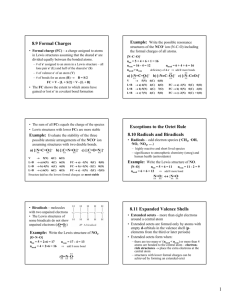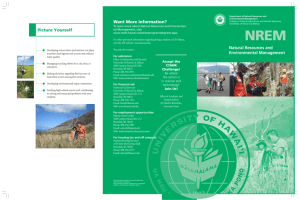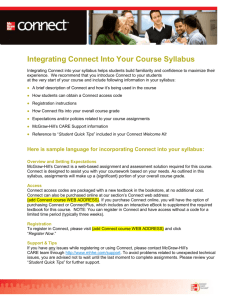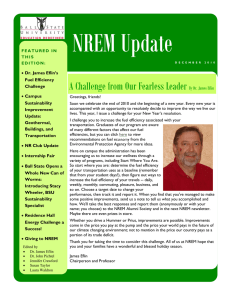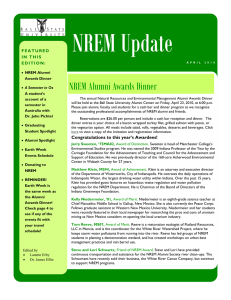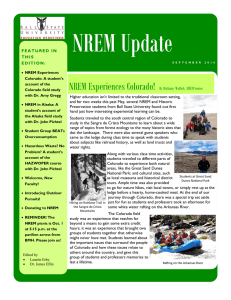NREM 611 - Oleson Lab
advertisement
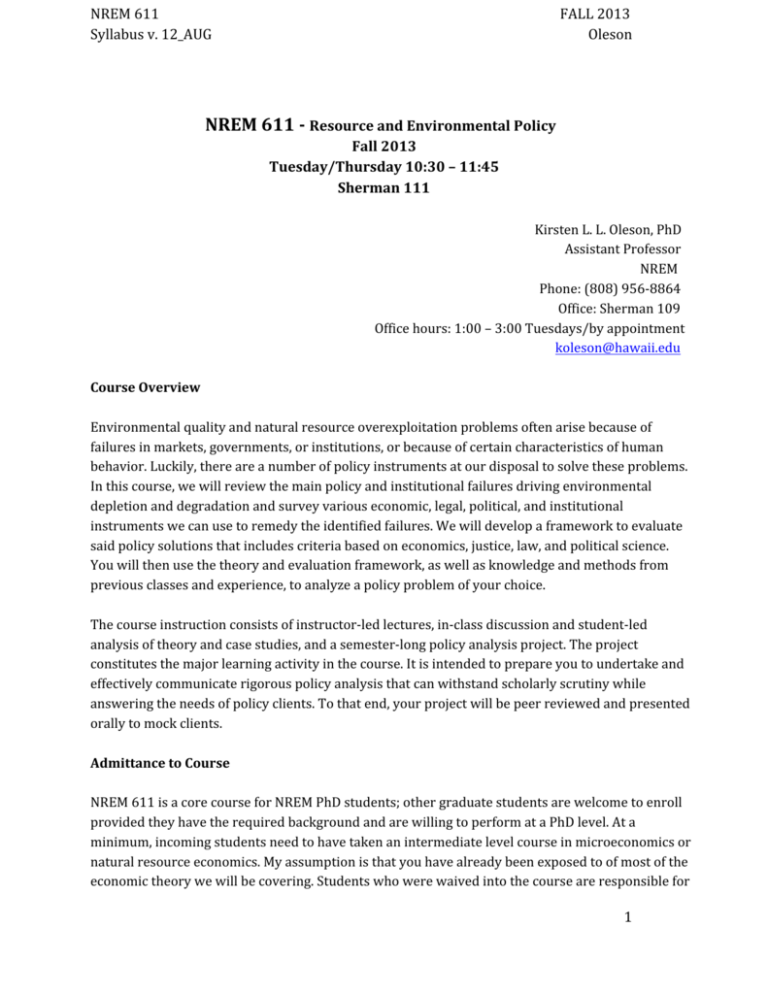
NREM 611 Syllabus v. 12_AUG FALL 2013 Oleson NREM 611 - Resource and Environmental Policy Fall 2013 Tuesday/Thursday 10:30 – 11:45 Sherman 111 Kirsten L. L. Oleson, PhD Assistant Professor NREM Phone: (808) 956-8864 Office: Sherman 109 Office hours: 1:00 – 3:00 Tuesdays/by appointment koleson@hawaii.edu Course Overview Environmental quality and natural resource overexploitation problems often arise because of failures in markets, governments, or institutions, or because of certain characteristics of human behavior. Luckily, there are a number of policy instruments at our disposal to solve these problems. In this course, we will review the main policy and institutional failures driving environmental depletion and degradation and survey various economic, legal, political, and institutional instruments we can use to remedy the identified failures. We will develop a framework to evaluate said policy solutions that includes criteria based on economics, justice, law, and political science. You will then use the theory and evaluation framework, as well as knowledge and methods from previous classes and experience, to analyze a policy problem of your choice. The course instruction consists of instructor-led lectures, in-class discussion and student-led analysis of theory and case studies, and a semester-long policy analysis project. The project constitutes the major learning activity in the course. It is intended to prepare you to undertake and effectively communicate rigorous policy analysis that can withstand scholarly scrutiny while answering the needs of policy clients. To that end, your project will be peer reviewed and presented orally to mock clients. Admittance to Course NREM 611 is a core course for NREM PhD students; other graduate students are welcome to enroll provided they have the required background and are willing to perform at a PhD level. At a minimum, incoming students need to have taken an intermediate level course in microeconomics or natural resource economics. My assumption is that you have already been exposed to of most of the economic theory we will be covering. Students who were waived into the course are responsible for 1 NREM 611 Syllabus v. 12_AUG FALL 2013 Oleson “catching up” with the theory on their own time – we’re going to go pretty fast because we are also learning methods for policy analysis. Course Learning Outcomes On completion of the course, you will demonstrate: Knowledge and understanding: ● knowledge and understanding of the economic and institutional failures causing environmental depletion and degradation and the potential solutions ● methodological knowledge of policy analysis frameworks ● awareness of various criteria that can be used to evaluate policy solutions Skills and abilities: ● the ability to critically, systematically, and independently analyze complex environmental problems to uncover the causes and potential policy solutions ● the ability to evaluate policy solutions across a broad spectrum of criteria, and generate and justify recommendations based on rigorous analysis ● the ability to clearly express your arguments and analysis to peers and stakeholders, both orally and in writing ● the ability to draw upon interdisciplinary knowledge and methods, and to work in diverse teams Judgment and approach: ● the ability to make well-considered judgments about appropriate policy solutions that incorporate economic, ethical, social, and cultural aspects ● the ability to apply lessons from course and case study to environmental problems in other contexts Required texts Two texts are required: 1. Weimer, D.L. and Vining, A. R. (2011). Policy analysis, 5th edition. Upper Saddle River, NJ: Pearson Publications, Inc. (“WV” in Schedule) 2. Sterner, T. and Coria, J. (2012). Policy instruments for environmental and natural resource policy, 2nd edition. Washington, DC:RFF Press. (“SC” in Schedule) For those who need to brush up on micro- and environmental economics, I recommend the following introductory texts: ● Klein, G. and Y. Bauman (2010) The cartoon guide to economics: Vol. 1 Microeconomics. New York:Hill and Wang. 2 NREM 611 Syllabus v. 12_AUG FALL 2013 Oleson ● Tietenberg, T. and L. Lewis (2012). Environmental and natural resource economics, 9th edition. Upper Saddle River, NJ:Pearson Publications, Inc. ● Goodstein, E. (2011) Economics and the Environment, 6th edition. Hoboken, NJ:Wiley and Sons, Inc. Other readings will be distributed through the course website, or you will have to access them through the UH library system. It is your responsibility to check the course website regularly and to ensure you read assigned articles (whether or not pdfs are posted). Assessment/grading Course assessment will be based on the following activities and assignments: Policy analysis case study [55%] ● Proposal [5%] ● Final paper and response to peer review/comments [35%] ● Policy brief [5%]* ● Proposal presentation [5%] ● Final presentation [5%] Content [25%] ● Quizzes [15%]* ● Midterm [10%]* Participation [20%] ● Peer review [5%]* ● Teach a paper [5%]* ● Other days [10%]* A * indicates that the assignment is based on your individual work; items without the * are team grades. I reserve the right to adjust any team member’s grade to reflect extraordinary or sub-par effort. Rubrics for grading the policy analysis assignments will include criteria on demonstrating your ability to apply theory, express cogent arguments and respond to counterpoints or objections, and your teamwork. There will be four unannounced quizzes throughout the semester. Three will count towards your final grade. Your class participation will be evaluated on the quality, relevance, and cogency of your comments (not frequency and length) and your ability to constructively and respectfully engage with your classmates, readings, and me. Questions during lectures are expected and encouraged. You may also use the online class forum to post your thoughts. Grades will be assigned based on the following scale: 3 NREM 611 Syllabus v. 12_AUG A+ >97 A A- FALL 2013 Oleson B+ 90>x≥87 C+ 80>x≥77 97>x≥93 B 93>x≥90 B- 87>x≥83 C 83>x≥80 C- D + 77>x≥73 D F 73>x≥7 70>x≥67 67>x≥63 <60 0 Policy analysis case study The policy analysis case is meant to give you an opportunity to apply the theories and cases we will be discussing in class to a real-world environmental problem of interest to you. This is a team project. Groups of 3-4 students should decide on a problem of mutual interest. I highly recommend forming this team early, and ensuring that the make-up is interdisciplinary with a broad set of skills (stats, econ, science, communication). I will provide much more information in the coming weeks on the assignments, and we will spend considerable time in class discussing the project. The projects walk the line between scholarship and policy: the analysis has to be robust, but you cannot be such a policy wonk that decision-makers are unable to assimilate your hard work. We will work on the skills required to produce high impact policy analysis. Peer review is an integral part of the process; you will carefully review your peers’ work to help them, and they will offer you comments that you will need to incorporate and/or rebut. Expectations Of you: ● Come to class prepared so that you can actively participate in class discussions. ● Respectfully and politely engage with your peers and instructors, share your opinions, know the difference between opinion and fact, back up your arguments with evidence, listen carefully to the opinions and arguments of others, be willing to assimilate new information and change your mind if other arguments are more cogent than yours, ask for clarification, be succinct ● Contribute your fair share to your team project ● Complete assignments on time ● Keep up to date – the course schedule is subject to alterations Of me: My role is to design and teach the course such that you achieve the course outcomes. To that end, I will: ● Be punctual, prepared, and enthusiastic ● Clearly communicate course content, expectations, policies, and assignments ● Listen carefully to questions and concerns ● Be available during office hours to provide assistance and feedback 4 NREM 611 Syllabus v. 12_AUG ● ● FALL 2013 Oleson Respectfully and politely engage with you in discussion (see above) Fairly assess your work Course evaluation by students As most of you know, this course has been redesigned to meet the needs of NREM students. Given the enthusiasm of the students, it will undoubtedly be a great class, but I would like to gather real-time feedback. I will be using numerous evaluation methods during the semester to make changes and improvements “on the run” (when possible) as well as to get feedback for longer-term improvements in course structure and content. I welcome constructive feedback and suggestions; please email, talk with me outside of class, or leave me an anonymous note in my mailbox. In addition, I will have you fill out 5-minute “WWW/CBB” (What went well, Could have been better) index cards on a regular basis. I will also solicit support from the Center for Teaching Excellence, and hope for your honest cooperation. Student support ● If you (or someone you know) need support in personal, academic, or career concerns, UH offers confidential and free support services (http://www2.hawaii.edu/~csdc/). If you feel you need reasonable accommodations because of the impact of a disability, please contact the KOKUA Program: http://www.hawaii.edu/kokua/; and speak with me privately to discuss your specific needs. ● Writing is a skill whose development takes time and dedication. I strongly suggest you seek outside help – even great writers can improve! UH has a writing center where you can get 1 hour a week of free tutoring. Please use it (and book early)! http://www.english.hawaii.edu/writingcenter/ ● We have access to a wonderful research librarian, Eileen Herring, (eherring@hawaii.edu) who can help you access all kinds of data, direct you to resources, and even find quiet study nooks. She set up a useful page for NREM: http://guides.library.manoa.hawaii.edu/NaturalResourceMgt ● Attendance/late policy Please attend class and be on time. Your grade and my opinion of you will suffer if you don’t. I will excuse absences for emergencies, illness, or fieldwork (see me for what you need to do). I expect you to come to class prepared to engage in discussion and wrestle with the theory and cases we’ll be covering. To this end, you should carefully do all readings prior to the start of class (ideally well before so you have time to think about them). All assignments need to be turned in on time – the course schedule is very tight and your peers (and I) require time to do their (my) reviews. Turning assignments in late will affect the quality of the reviews, and thus the quality of your products. This 5 NREM 611 Syllabus v. 12_AUG FALL 2013 Oleson will, obviously, impact your grades, and I also reserve the right to reduce your grade on any assignment (or not accept it at all) if it is late. Due dates are clearly labeled in the Schedule. Other policies It hopefully goes without saying that cheating, plagiarism, and other forms of dishonesty will not be tolerated. In fact, I have a zero tolerance policy: you cheat or plagiarize, you fail. If you have any questions about what constitutes cheating or plagiarism (hopefully dishonesty is clear), please refer to the definitions in the UH student conduct code (http://www.manoa.hawaii.edu/students/conduct/). If you still have questions please! get in touch before you turn something in. There is nothing wrong with asking – often plagiarism is a gray area, especially in academics where we each build on each other’s work and ideas. But violations could have serious academic repercussions for you in this class and beyond. 6


